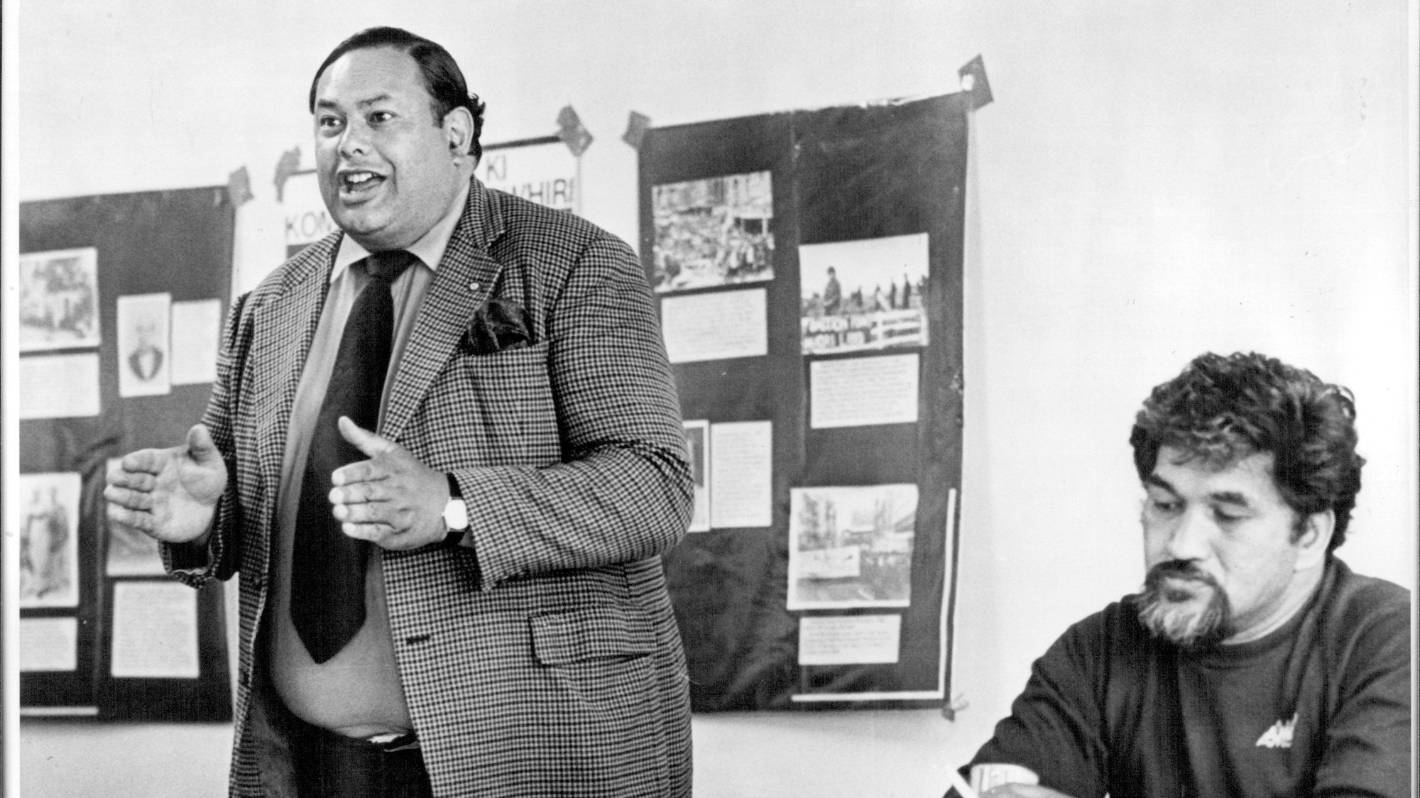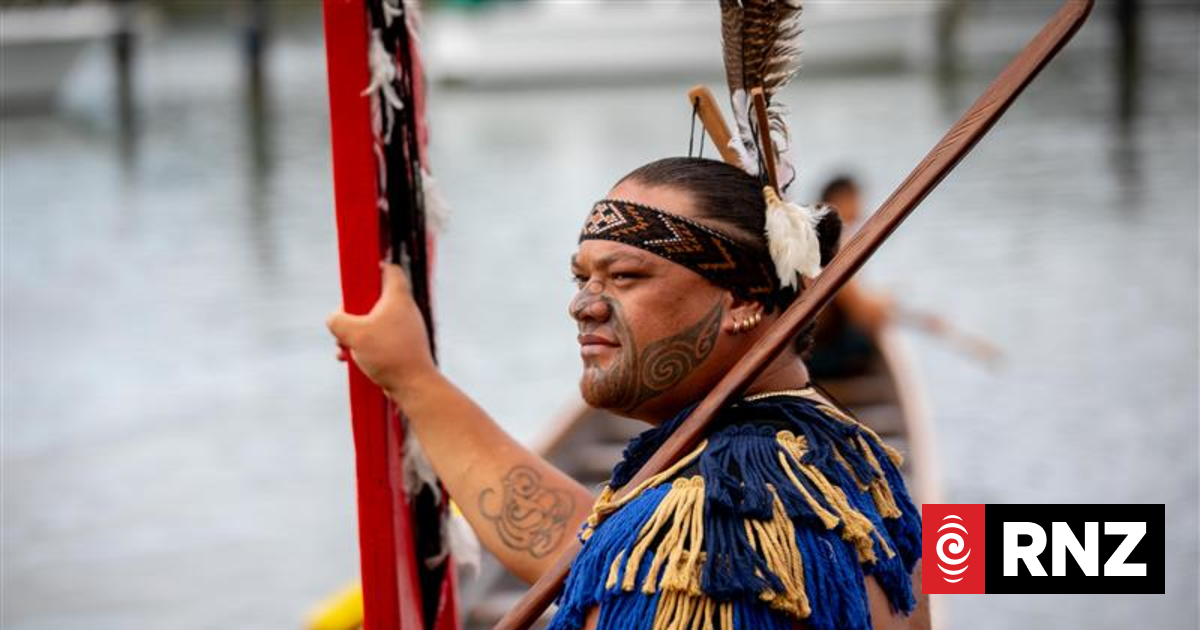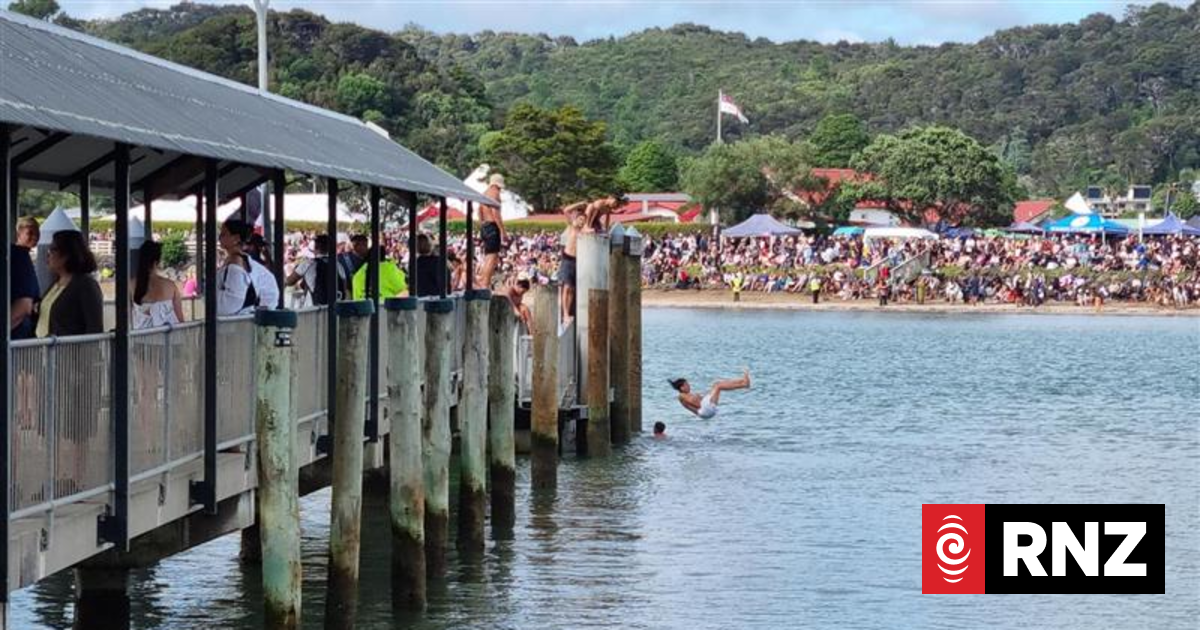Tributes have poured in for Māori rights activist and author Te Ringa Mangu (Dun) Mihaka, who died on Tuesday at the age of 81.
Relentless in his pursuit of justice for Māori, the 1977-78 Takaparawhau/Bastion Point occupation, a significant land rights battle for Māori, was one of many protest actions Mihaka was involved in over the years.
His nephew, Government minister and MP for Tāmaki Makaurau, Peeni Henare said Mihaka was loved and respected throughout the north, and wider Aotearoa.
John Selkirk/Stuff
Māori rights activist and author Dun Mihaka, right, in 1983 with Maui Pomare.
“For those who know Matua Dun, he was a staunch man. He always fought for what he believed in,” he said.
“In fact, in a particular time in court, if it wasn’t for him saying that he only wanted to speak Māori, he started off a chain of events that now sees people in front of court, or people who are in any role in court, get to speak te reo Māori,” Henare said.
“Matua was a very influential man from the Far North, and with him, it marks an end of an era. He was well known for his protest actions. One of them was he pulled the whakapohane, or the brown eye in protest, which marked the kind of man he was. He was always passionate about what he believed in and fought for it.”
ROBERT KITCHIN/Stuff
Government minister and Tāmaki Makaurau MP Peeni Henare says Mihaka was well respected and “fought for what he believed in”.
In 1983, Mihaka performed whakapohane [bared his buttocks] to then Prince Charles and the late Princess Diana on their royal tour of New Zealand – potentially his most well known act.
Speaking to Radio Waatea, former Māori Language Commissioner and Te Rarawa kaumātua Haami Piripi said he was in court the day Mihaka refused to speak English to the judge.
“It was that stand that shifted the court’s thinking and the court’s ability to respond to our particular needs, to accepting the status of te reo Māori as a language of use,” he said.
“The judge would say to him ‘yes, but I know you can speak English’, and he would say, ‘Ehara i te mea kua mōhio koe. Ko te reo Māori tōku reo.’ (It’s not as if you know [I can speak English]. My language is te reo Māori.)
“Making a stand like that takes guts and it always enrages the system, which was what he was able to do,” Piripi said. “He’s the guy who showed his bum to royalty and got away with it. Sure he was arrested, but he’s remembered for it.”
CHRISTEL YARDLEY/STUFF/Waikato Times
Artist and activist Tame Iti recalls Mihaka’s stubborn advocacy.
Artist and activist Tāme Iti recalls meeting Mihaka at the Māori tent embassy at Parliament in 1972, marking the beginning of their friendship.
“When I first met Dun, he came up in his shorts and his boots and I had no idea who he was.
“He was a very interesting character,” Iti said, describing Mihaka as stubborn and someone who took on a lot of battles by himself.
He was also a champion of te reo Māori, Iti said.
“Mihaka was well known for conducting all of his court cases in te reo Māori even though the judges at that time continued to say no. He was very clear and articulate in the way he presented himself and how he challenged the colonisers.”
Iti was inspired by his critical thinking.
“We hung out together, we walked together, we debated together. He’s a strong advocate of challenging the system, and even our systems internally.
“He’s created a lot of challenges, more so to ourselves than to others in the system because we’re very much colonised ourselves.
“Dun was very good at responding to the racism in the system, to our exclusion within the court, within the education department, and in every corner of government mentality.”
“He’s a big fulla – he’s a bully,” said Iti. “But I still have a lot of time and respect for Dun.”
RICKY WILSON/STUFF
Ngāti Whātua kaumātua Alec Hawke said Mihaka was a staunch supporter of the Bastion Point occupation.
Ngāti Whātua kaumatua Alec Hawke said Mihaka would always be remembered for standing with Ngāti Whātua Ōrākei, particularly during the Takaparawhau occupation.
“Dun Mihaka was a staunch supporter of the Bastion Point occupation and came often to stand with whānau occupying our land to stop the Crown from proceeding with development,” he said.
“He will be fondly remembered for his oratory, wit and defiance to protect Māori whenua, reo and whānau. Aku aroha ki te whānau.”
Minister for Māori Development Willie Jackson said Mihaka was a “fighter for Māori rights”.
“Dun was someone who was different to others, Dun always did his own thing. He was a huge advocate of te ao Māori, he was a ferocious advocate in many ways,” he said.
Karoline Tuckey/Stuff
Mihaka would call out other Māori at the “drop of a hat” if he felt like they were selling out their people.
“He was a take-no-prisoners type of bloke, couldn’t be bothered with the Crown… he had total distain for the monarchy.”
Jackson said Mihaka would call out other Māori at the “drop of a hat” if he felt like they were selling out their people.
“There was very few who would challenge him because he was a big, strong man who had a lot of conviction… a lot of principle, a lot of passion in terms of advocacy for Māori.”
Mihaka is being taken up to Parawhenua Marae, near Kaikohe.



